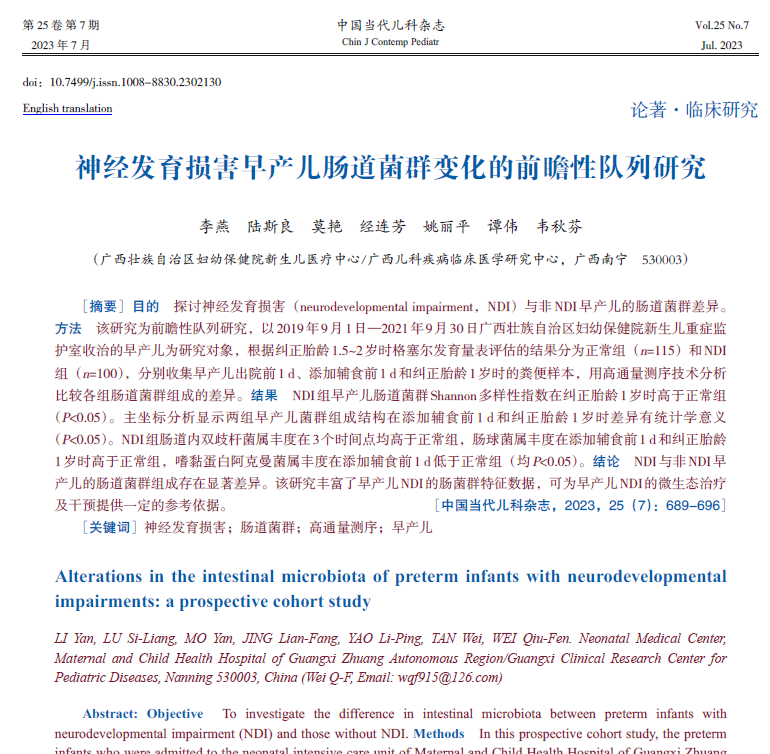目的 探讨神经发育损害(neurodevelopmental impairment,NDI)与非NDI早产儿的肠道菌群差异。 方法 该研究为前瞻性队列研究,以2019年9月1日—2021年9月30日广西壮族自治区妇幼保健院新生儿重症监护室收治的早产儿为研究对象,根据纠正胎龄1.5~2岁时格塞尔发育量表评估的结果分为正常组(n=115)和NDI组(n=100),分别收集早产儿出院前1 d、添加辅食前1 d和纠正胎龄1岁时的粪便样本,用高通量测序技术分析比较各组肠道菌群组成的差异。 结果 NDI组早产儿肠道菌群Shannon多样性指数在纠正胎龄1岁时高于正常组(P<0.05)。主坐标分析显示两组早产儿菌群组成结构在添加辅食前1 d和纠正胎龄1岁时差异有统计学意义(P<0.05)。NDI组肠道内双歧杆菌属丰度在3个时间点均高于正常组,肠球菌属丰度在添加辅食前1 d和纠正胎龄1岁时高于正常组,嗜黏蛋白阿克曼菌属丰度在添加辅食前1 d低于正常组(均P<0.05)。 结论 NDI与非NDI早产儿的肠道菌群组成存在显著差异。该研究丰富了早产儿NDI的肠菌群特征数据,可为早产儿NDI的微生态治疗及干预提供一定的参考依据。
Abstract
Objective To investigate the difference in intestinal microbiota between preterm infants with neurodevelopmental impairment (NDI) and those without NDI. Methods In this prospective cohort study, the preterm infants who were admitted to the neonatal intensive care unit of Maternal and Child Health Hospital of Guangxi Zhuang Autonomous Region from September 1, 2019 to September 30, 2021 were enrolled as subjects. According to the assessment results of Gesell Developmental Scale at the corrected gestational age of 1.5-2 years, they were divided into two groups: normal (n=115) and NDI (n=100). Fecal samples were collected one day before discharge, one day before introducing solid food, and at the corrected gestational age of 1 year. High-throughput sequencing was used to compare the composition of intestinal microbiota between groups. Results Compared with the normal group, the NDI group had a significantly higher Shannon diversity index at the corrected gestational age of 1 year (P<0.05). The principal coordinate analysis showed a significant difference in the composition of intestinal microbiota between the two groups one day before introducing solid food and at the corrected gestational age of 1 year (P<0.05). Compared with the normal group, the NDI group had a significantly higher abundance of Bifidobacterium in the intestine at all three time points, a significantly higher abundance of Enterococcus one day before introducing solid food and at the corrected gestational age of 1 year, and a significantly lower abundance of Akkermansia one day before introducing solid food (P<0.05). Conclusions There are significant differences in the composition of intestinal microbiota between preterm infants with NDI and those without NDI. This study enriches the data on the characteristics of intestinal microbiota in preterm infants with NDI and provides reference for the microbiota therapy and intervention for NDI in preterm infants.
关键词
神经发育损害 /
肠道菌群 /
高通量测序 /
早产儿
Key words
Neurodevelopmental impairment /
Intestinal microbiota /
High-throughput sequencing /
Preterm infant
{{custom_sec.title}}
{{custom_sec.title}}
{{custom_sec.content}}
参考文献
1 Young S, González RA, Mullens H, et al. Neurodevelopmental disorders in prison inmates: comorbidity and combined associations with psychiatric symptoms and behavioural disturbance[J]. Psychiatry Res, 2018, 261: 109-115. PMID: 29291476. DOI: 10.1016/j.psychres.2017.12.036.
2 GuangXi Cooperative Research Group for Extremely Preterm Infants, Li Y, Meng DH, et al. Neurodevelopmental outcomes of extremely preterm infants in southern China: a multicenter study[J]. Early Hum Dev, 2019, 133: 5-10. PMID: 30991237. DOI: 10.1016/j.earlhumdev.2019.04.002.
3 Mayer EA, Nance K, Chen S. The gut-brain axis[J]. Annu Rev Med, 2022, 73: 439-453. PMID: 34669431. DOI: 10.1146/annurev-med-042320-014032.
4 Agirman G, Hsiao EY. SnapShot: the microbiota-gut-brain axis[J]. Cell, 2021, 184(9): 2524-2524.e1. PMID: 33930299. DOI: 10.1016/j.cell.2021.03.022.
5 Sim K, Powell E, Cornwell E, et al. Development of the gut microbiota during early life in premature and term infants[J]. Gut Pathog, 2023, 15(1): 3. PMID: 36647112. PMCID: PMC9841687. DOI: 10.1186/s13099-022-00529-6.
6 Parsons E, Claud K, Petrof EO. The infant microbiome and implications for central nervous system development[J]. Prog Mol Biol Transl Sci, 2020, 171: 1-13. PMID: 32475519. DOI: 10.1016/bs.pmbts.2020.04.007.
7 Schwarz E, Maukonen J, Hyyti?inen T, et al. Analysis of microbiota in first episode psychosis identifies preliminary associations with symptom severity and treatment response[J]. Schizophr Res, 2018, 192: 398-403. PMID: 28442250. DOI: 10.1016/j.schres.2017.04.017.
8 Cao X, Lin P, Jiang P, et al. Characteristics of the gastrointestinal microbiome in children with autism spectrum disorder: a systematic review[J]. Shanghai Arch Psychiatry, 2013, 25(6): 342-353. PMID: 24991177. PMCID: PMC4054584. DOI: 10.3969/j.issn.1002-0829.2013.06.003.
9 Aarts E, Ederveen THA, Naaijen J, et al. Gut microbiome in ADHD and its relation to neural reward anticipation[J]. PLoS One, 2017, 12(9): e0183509. PMID: 28863139. PMCID: PMC5581161. DOI: 10.1371/journal.pone.0183509.
10 Diamanti T, Prete R, Battista N, et al. Exposure to antibiotics and neurodevelopmental disorders: could probiotics modulate the gut-brain axis?[J]. Antibiotics (Basel), 2022, 11(12): 1767. PMID: 36551423. PMCID: PMC9774196. DOI: 10.3390/antibiotics11121767.
11 刘瑞琪, 黄为民. 早产儿肠道菌群定植研究进展[J]. 中国妇幼保健, 2022, 37(7): 1353-1356. DOI: 10.19829/j.zgfybj.issn.1001-4411.2022.07.054.
12 Stewart CJ, Ajami NJ, O'Brien JL, et al. Temporal development of the gut microbiome in early childhood from the TEDDY study[J]. Nature, 2018, 562(7728): 583-588. PMID: 30356187. PMCID: PMC6415775. DOI: 10.1038/s41586-018-0617-x.
13 LaTuga MS, Ellis JC, Cotton CM, et al. Beyond bacteria: a study of the enteric microbial consortium in extremely low birth weight infants[J]. PLoS One, 2011, 6(12): e27858. PMID: 22174751. PMCID: PMC3234235. DOI: 10.1371/journal.pone.0027858.
14 Matamoros S, Gras-Leguen C, Le Vacon F, et al. Development of intestinal microbiota in infants and its impact on health[J]. Trends Microbiol, 2013, 21(4): 167-173. PMID: 23332725. DOI: 10.1016/j.tim.2012.12.001.
15 Seki D, Mayer M, Hausmann B, et al. Aberrant gut-microbiota-immune-brain axis development in premature neonates with brain damage[J]. Cell Host Microbe, 2021, 29(10): 1558-1572.e6. PMID: 34480872. PMCID: PMC8525911. DOI: 10.1016/j.chom.2021.08.004.
16 Groer MW, Luciano AA, Dishaw LJ, et al. Development of the preterm infant gut microbiome: a research priority[J]. Microbiome, 2014, 2: 38. PMID: 25332768. PMCID: PMC4203464. DOI: 10.1186/2049-2618-2-38.
17 Henrick BM, Rodriguez L, Lakshmikanth T, et al. Bifidobacteria-mediated immune system imprinting early in life[J]. Cell, 2021, 184(15): 3884-3898.e11. PMID: 34143954. DOI: 10.1016/j.cell.2021.05.030.
18 Sarkar A, Lehto SM, Harty S, et al. Psychobiotics and the manipulation of bacteria-gut-brain signals[J]. Trends Neurosci, 2016, 39(11): 763-781. PMID: 27793434. PMCID: PMC5102282. DOI: 10.1016/j.tins.2016.09.002.
19 Stuivenberg GA, Burton JP, Bron PA, et al. Why are bifidobacteria important for infants?[J]. Microorganisms, 2022, 10(2): 278. PMID: 35208736. PMCID: PMC8880231. DOI: 10.3390/microorganisms10020278.
20 Beghetti I, Barone M, Turroni S, et al. Early-life gut microbiota and neurodevelopment in preterm infants: any role for Bifidobacterium?[J]. Eur J Pediatr, 2022, 181(4): 1773-1777. PMID: 34842970. DOI: 10.1007/s00431-021-04327-1.
21 Cani PD, Depommier C, Derrien M, et al. Akkermansia muciniphila: paradigm for next-generation beneficial microorganisms[J]. Nat Rev Gastroenterol Hepatol, 2022, 19(10): 625-637. PMID: 35641786. DOI: 10.1038/s41575-022-00631-9.
基金
广西自然科学基金资助项目(2019GXNSFBA185040);广西科技计划项目(桂科AD22035121)。
 PDF(1311 KB)
PDF(1311 KB)


 PDF(1311 KB)
PDF(1311 KB)
 PDF(1311 KB)
PDF(1311 KB)
